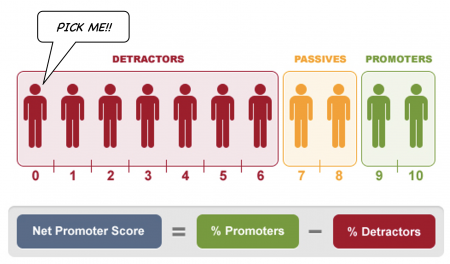Net promoter score: Difference between revisions
Amwelladmin (talk | contribs) No edit summary |
Amwelladmin (talk | contribs) No edit summary |
||
| Line 1: | Line 1: | ||
{{a|devil|}}Usually taking the form of a survey question along the lines “on a scale of 1-10, [[how likely are you to recommend us to a friend or colleague?]]” the [[net promoter score]] is a device, recognised by [[those who know]], to measure meaningful client loyalty likelihood or client referrals, recommendations, and repeat business. The aggregate data spinning of an NPS question is considered, by [[those who know]], as | {{a|devil| | ||
[[File:Net Promoter Score.png|450px|thumb|center|How to vote if you find NPS questionnaires tiring.]] | |||
}}Usually taking the form of a survey question along the lines “on a scale of 1-10, [[how likely are you to recommend us to a friend or colleague?]]” the [[net promoter score]] is a device, recognised by [[those who know]], to measure meaningful client loyalty likelihood or client referrals, recommendations, and repeat business. The aggregate data spinning of an NPS question is considered, by [[those who know]], as a good [[proxy]] for forecasting business grown and the health of one’s brand. | |||
But, when you have been inundated with NPS questionnaires for anything from yeast extract to the London Underground (like, is there an ''alternative''?) just how likely you are to recommend an asset manager, insurance company, debt collection agency, or broker-dealer it is hard to say, though, if that score is more than a tepid 4, difficult to believe. | But, when you have been inundated with NPS questionnaires for anything from yeast extract to the London Underground (like, is there an ''alternative''?) just how likely you are to recommend an asset manager, insurance company, debt collection agency, or broker-dealer it is hard to say, though, if that score is more than a tepid 4, difficult to believe. | ||
It is hard to credit that information given under protest but still for free at the end of meaningless encounter with customer support can, when aggregated, tell the firm anything about how its customers regard it — surprise surprise, the theory behind the NPS questionnaire is based on pure, dumb [[correlation]] — and since the arithmetic behind the NPS calculation is elementary, there is a simple way to banish them from the common currency: consistently vote them ''down''. It is not a question of ''whether'' you recommend your favourite epoxy resin to your friends and family — why do you care whether they know that or not? — but whether you want to be bombarded with these stupid questionnaires. The simple answer is to vote ''no''. | |||
Revision as of 11:59, 23 December 2021

|
Usually taking the form of a survey question along the lines “on a scale of 1-10, how likely are you to recommend us to a friend or colleague?” the net promoter score is a device, recognised by those who know, to measure meaningful client loyalty likelihood or client referrals, recommendations, and repeat business. The aggregate data spinning of an NPS question is considered, by those who know, as a good proxy for forecasting business grown and the health of one’s brand.
But, when you have been inundated with NPS questionnaires for anything from yeast extract to the London Underground (like, is there an alternative?) just how likely you are to recommend an asset manager, insurance company, debt collection agency, or broker-dealer it is hard to say, though, if that score is more than a tepid 4, difficult to believe.
It is hard to credit that information given under protest but still for free at the end of meaningless encounter with customer support can, when aggregated, tell the firm anything about how its customers regard it — surprise surprise, the theory behind the NPS questionnaire is based on pure, dumb correlation — and since the arithmetic behind the NPS calculation is elementary, there is a simple way to banish them from the common currency: consistently vote them down. It is not a question of whether you recommend your favourite epoxy resin to your friends and family — why do you care whether they know that or not? — but whether you want to be bombarded with these stupid questionnaires. The simple answer is to vote no.